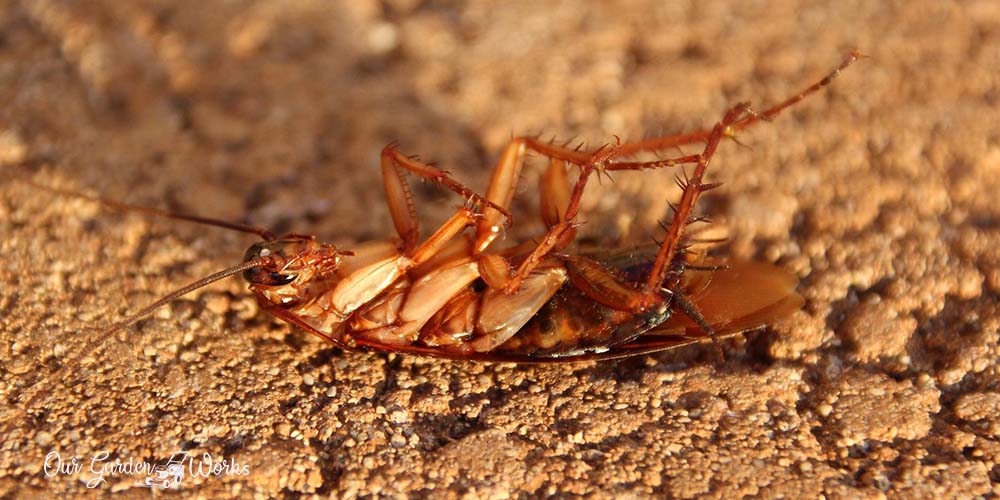Just the thought of sneaky crawlers like water bugs can freak anyone out. Often mistaken as the palmetto bugs, water bugs are one of the homeowner’s worst nightmares. If you have seen a couple of them around your house, live in peace by learning how to get rid of water bugs for good.
Are Cockroaches and Water Bugs The Same?
Before starting your plans on killing these creepy crawlers, did you know that the term water bug is used by homeowners to identify different kinds of roaches?
Water bugs is a colloquial term used to name a specific group of outdoor roaches like oriental, smoky brown, and American roaches.
The term water bug is often used by some old folks to call large types of roaches. These areas include:
- North Texas
- North Carolinians(from the native Carolinians)
- South and Central Illinois
- Georgia
- New York
In a local news report, WNYC’s Shumita Basu explained that the difference between water bugs and cockroaches is more on their behavior. The real water bug (Nepomorpha) are predators that kill aquatic living things to suck their juices, inject some venom into them and digest them like food. They are worse than roaches which only roam around houses for food and water.
The water bug we will feature in this post is not the alien-looking giant water bugs living in swamps known as toe-biters. Instead, these critters live outdoors but shelter in the dark, moist, and humid areas of the house.
Now, let’s know more about your archnemesis so you can prevent them from invading your safe space at home!
How To Get Rid of Water Bugs – 4 Methods
Most homeowners want a quick fix to get rid of the freaky waterbugs. These nasty critters can contaminate anything they touch, and once they get in your pantry or dish racks, they can cause your family to get sick. An even worse thing is they can fly!
There are several approaches to killing water bugs. So, we grouped these approaches as quick-fix (strong pesticides), long-term solutions, gel-baits, and organic options.
Method #1: The Quick-Fix
Who wouldn’t love an instant kill for the freaky water bugs? It can be easy to squish or swat these small insects, but they are tough enough to withstand these methods due to their physical features. So, you’ll need a stronger option like chemical pesticides.
Water bugs are good at grooming themselves. Once they touch a contact pesticide, the chemicals will eventually get into their system and kill them.
The potent solution to control water bugs instantly is the use of pyrethrins. Cypermethrin specifically kills soft-bodied insects like water bugs and other types of roaches.
Here are some brands that are tried and tested for their swift doom on water bugs:
1. Demon WP Insecticide
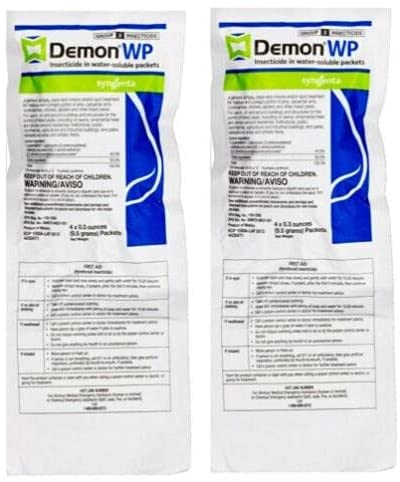
Demon WP is a water-soluble insecticide that you can spray in areas where you frequently see water bugs. It can also kill other pesky bugs indoors, like spiders. It is a perfect option to spray around the nooks and crannies in your attic or storage areas to reveal the hiding bugs.
Demon WP has a residual effect in the treated area which makes it an inappropriate option for homeowners with pets roaming around.
2. Ortho Home Defense Insect Killer for Indoor & Perimeter
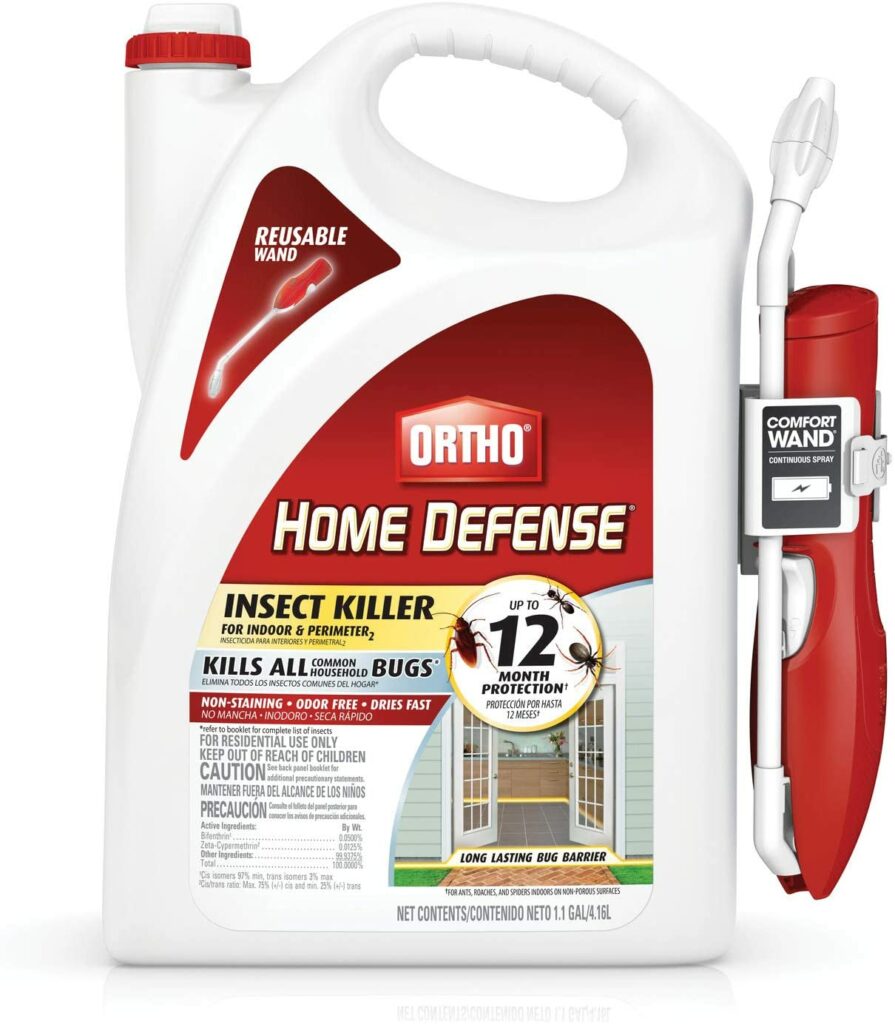
Another multi-purpose insecticide for water bugs is the Ortho Home Defense Killer, which contains a powerful combination of two types of pyrethrin such as bifenthrin and cypermethrin. It comes with an easy-to-use packaging with a sprayer wand so you can spray on hard-to-reach areas.
3. Tempo Sc Ultra Premise Pest Control Spray
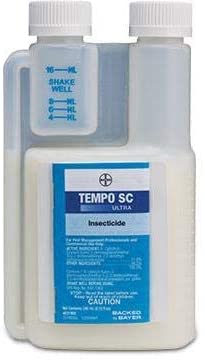
Do you want something that can kill waterbugs in minutes?
Try Tempo SC Pest Control Spray and bring out all the hiding waterbugs in your house, even in areas where you think they can’t fit. It remains an unfound gem for homeowners and a trade secret for professional pest control service providers.
Method #2: The Long Term Solution – Target The Whole Colony With Controlled-Release Insecticides
While some insecticides are effective in killing bugs instantly, other brands feature a longer residual effect. With that, water bugs won’t even attempt to go back to your house for shelter and food.
Check out the brand from Syngenta that can provide the long-lasting relief from water bugs below:
1. Syngenta 73654 Demand CS Insecticide
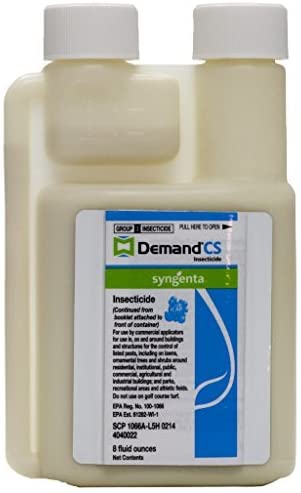
Syngenta Demand CS Insecticide offers a longer residual effect in controlling water bugs for up to 90 days. While Demon Insecticide kills roaches and water bugs instantly, it may not keep them out longer than Demand CS.
As a long-term option, Demand CS works by allowing its microencapsulated products to attach to the hair and legs of waterbugs. Then, the critters will bring the insecticide to their hidden nests and spread the poison to other bugs.
Once the insecticide has spread to the entire colony, the microcapsules will disperse the insecticide and kill them all.
2. Zoecon Gentrol Point Source IGR
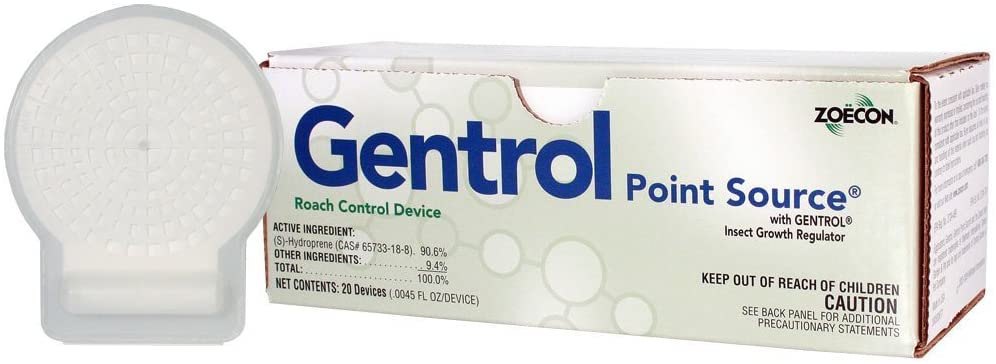
Most professional pest control service providers also advise the use of IGR or insect growth regulators to manage the heavy infestation of water bugs. They mimic the hormones of young water bugs and disrupt their ability to grow and reproduce.
One of the best brands that professionals trust is Zoecon Gentrol IGR. It has no odor and is an ideal option for areas where spraying is not the best option for pest control like the kitchen. A disc of IGR can treat up to 75 sq. ft. and must be reapplied after 3 months for best results.
It’s a bit more pricey than others but effective, especially when used with Advion Gel.
Method #3: Gel Bait That Kills Slowly But Surely (Kills The Whole Colony!)
If you’ve been searching about pesticides for roaches and water bugs, you most likely heard about gel baits. They are effective in eliminating pests for good but take longer than chemical sprays.
Here are the best ones that you can try:
1. Advion 383920 4 Tubes and 4 Plungers
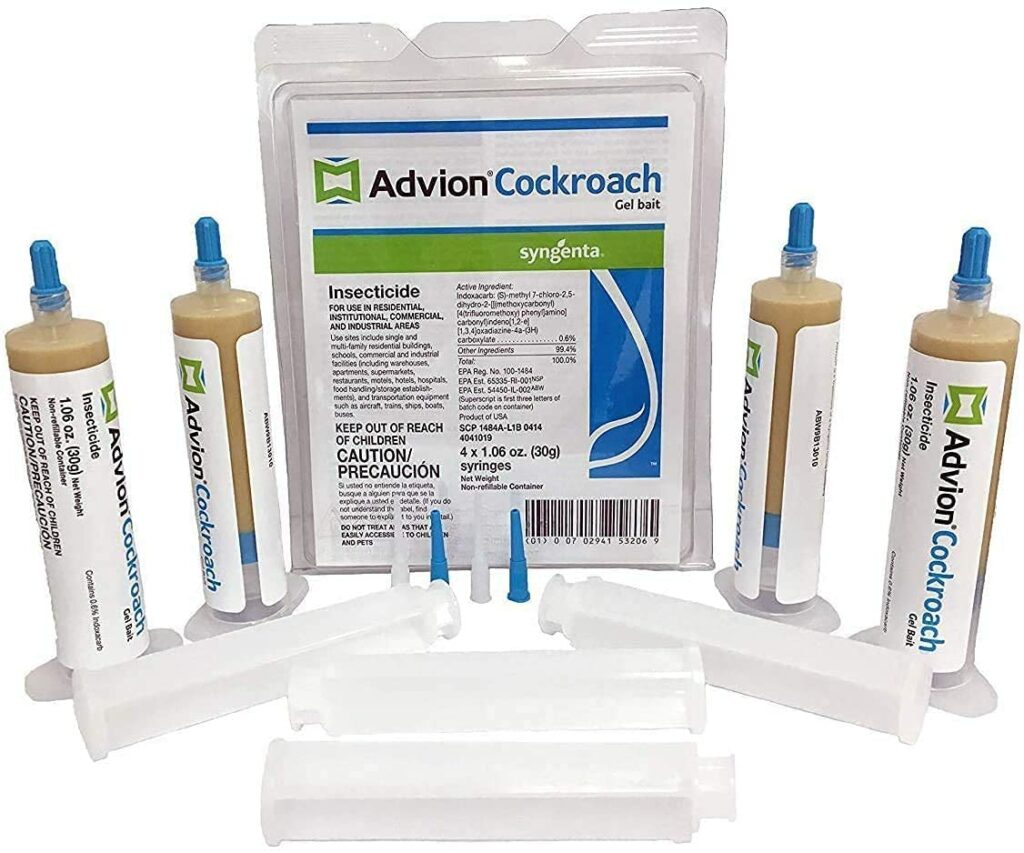
Advion gel baits are used by professionals for heavy water bug infestations. You can place it in the attic, near gutters, or in boiler rooms where you suspect there’s a nest located. Most homeowners find it effective for types of roaches commonly called water bugs like:
- German cockroach (Blattella germanica)
- American cockroach (Periplaneta americana)
- Oriental cockroach (Blatta orientalis)
For a more powerful effect, use Advion with Gentrol IGR and Demand CS to eliminate water bugs in your life for good.
2. 2 Tubes Maxforce FC Magnum
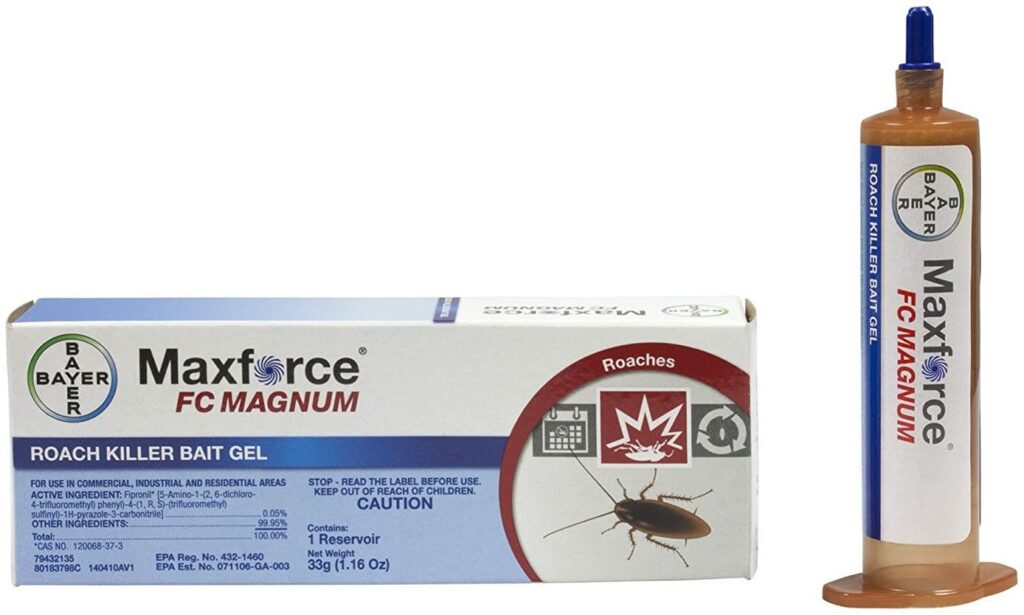
Maxforce FC Magnum is a good alternative for Advion in case the water bugs in your house have gained some resistance to it. It can instantly kill the bugs on the same day of the application once they touch the gel. What’s more, its residual effect can last for up to a year.
To see the best result, don’t use Maxforce FC Magnum with pesticide sprays to keep the bugs around. Otherwise, they will leave the area instead of biting into your trap.
Method #4: Kid and Pet-Friendly Pest Control – Organic Options
Synthetic pesticides are effective in killing water bugs, but they may pose some health risks for kids and pets. If you want to steer away from chemicals, here are some of the safer options that you can try:
1. Harris Roach Tablets With Lure
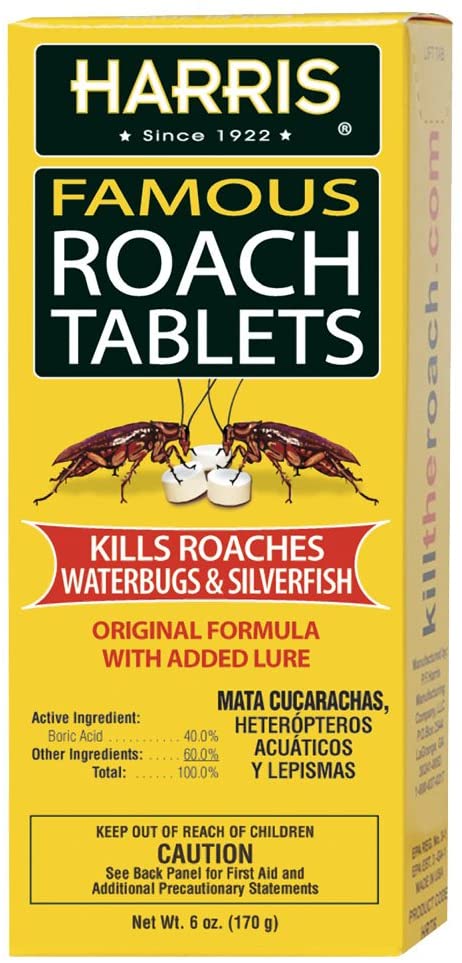
While you can use typical borax to kill water bugs, better try the ready-to-use boric acid tablets from HARRIS. Roaches and water bugs love feeding on these tablets which makes pest control easier than you expect.
If you can’t find their nests inside your house, better place two tablets in dark corners and leave them for a day. Once you come back, you will see the tablets have been eaten off and some dead water bugs around.
2. HARRIS Diatomaceous Earth Food Grade
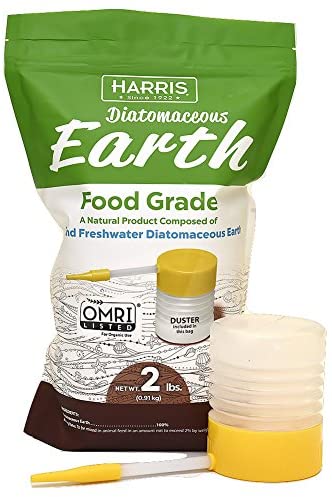
Diatomaceous earth is a multi-purpose pesticide used in the garden but can also be used on water bugs. It is safe to use around kids and pets as long as they don’t inhale it.
Spread it thinly using a duster in the tight spaces in your kitchen, attic, basement, near water pipes, and next to drainage holes. Don’t put too much DE since these smart critters are not fond of walking on clumps of powder.
Tips on Keeping a Water Bug-Free House
Your house becomes an ideal hideout for water bugs when there is food and water around. Roaches that are often called water bugs can live for a very long time without food but not with enough water. They thrive in moist, dark, and dusty environments.
If you want to keep water bugs for good and manage them in one treatment, here are some tips for a more efficient and cost-saving pest control:
#1 Identify The Infestation: Is It a Water Bug or a Cockroach-Looking Beetle?
Some insects look the same when you look at them from afar. Some homeowners fail to eliminate an infestation due to the wrong identification of the pest.
To know more about the beetles that look like cockroaches, check our post here for better analysis.
Before you plan your deathtrap, make sure that you are dealing with water bugs by knowing more about their features and behaviors below:
Water Bug Features
The water bugs that your parents or local community call water bugs are a group of outdoor roaches that include:
(1) Oriental roach: A large cockroach with a size of 18mm to 29mm. It has a glossy body. It may look wingless, but it has a non-functional wing next to its head. Its body is rounder, and its head is bigger than the common cockroach indoors.
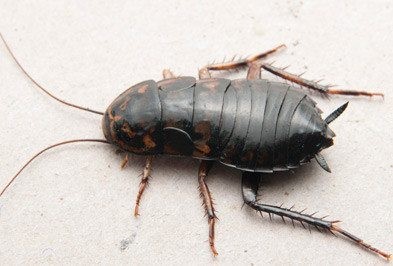
(2) American roaches: The largest house-infesting roaches in the US with a size of 32 to 54mm in length. Its distinct feature is that it has a number 8 pattern on its head.
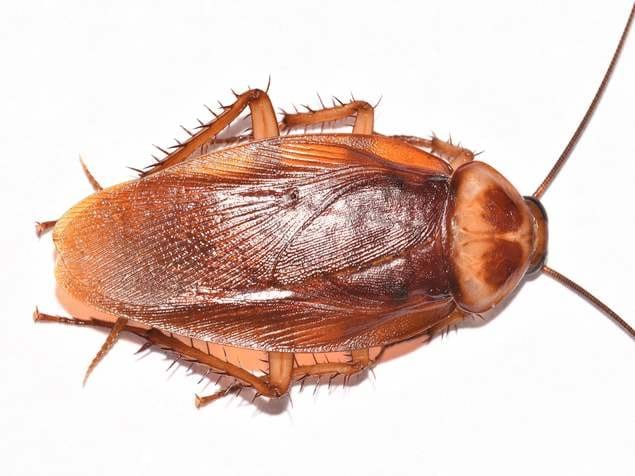
(3) Smoky brown roaches: A large type of roach that can reach up to 38mm. It is known for its dark brown mahogany color, which differs from the reddish-brown color of an American roach. As a good flier, it may fly around your house at night to search for food.
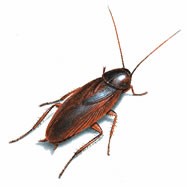
Behaviors
All water bugs got their name because they love staying in a moist and humid environment. They stay in moist, shaded, and protected areas in the house. In the outdoors, they love staying in the following hideouts:
- Under the dried leaves in the ground
- Firewood piles
- Old building materials lying around the property
- Crawl spaces under the foundation with a water leak
- Attic next to gutters
- Hollow trees or dead trees
Naturally, water bugs don’t stay indoors and may have probably stayed because of weather changes or just wandering around.
Since water bugs are a collective name given to several types of roaches, some have distinct differences in behavior. Identifying these features will help you distinguish each type from other types of pest infestation.
Here are the common behaviors of each so-called water bug that can help you locate the best areas to place your baits or spray pesticides:
Smoky brown roaches
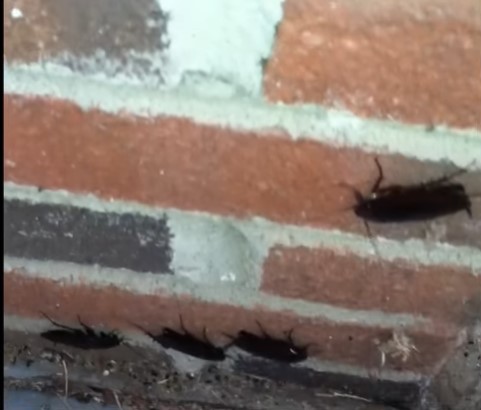
- Water bugs like smoky brown roaches leave their eggs hidden in protected locations where there is high humidity and moisture. The eggs will take about six months to develop. You will notice the re-emergence of a new batch of water bugs in just a few months after you thought you won against them.
- These insects are attracted to light at night If you have a porch light on, they may start to populate in the area.
- These insects feed on decaying organic matter like: Dead insects, Fecal matter of animals and humans, Rotten meats, Starch, and Sweets.
- Dead trees in a property can house a large number of smoky brown roaches. The deadwood structure absorbs the moisture from the rain, which invites these critters into the hollows of dead trees.
- They are common household pests in the southern states and Illinois, and Iowa.
Oriental roaches
- Oriental roaches love to stay near garbage cans, sewers, drainage systems, and basements next to water heaters and pumps. They love hiding, and they travel slower than other roaches.
- These insects move to a warmer place during the cold season.
- They are nocturnal and stay in their hiding place during the day.
- Unlike other roaches, oriental roaches secrete a distinct musty odor that allows them to communicate with each other.
- They are heavily dependent on water and will not survive more than two months without it. Yet, they can survive without food for a month.
- A single female oriental roach can produce up to 8 egg cases that contain 16 eggs each. Each egg hatches within 6 months during the warm season and 26 months during the cold season.
- True water bugs are carnivores, while oriental roaches are omnivores. They eat crumbs of food, decaying plants, and animals.
- The creepiest part of an oriental roach infestation is they gather next to water sources in large numbers. Homeowners who live next to a lake, river, open sewers, or ports are most likely to encounter these pests.
American roaches
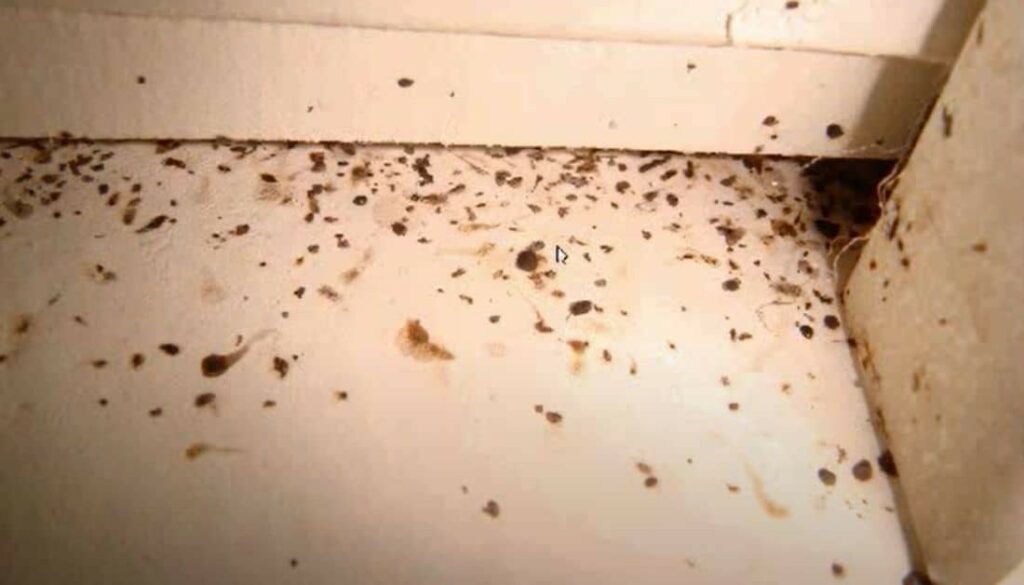
- American roaches are fast and run to their hiding spot when they see humans around.
- They leave their tiny feces or droppings around their hiding spot.
- Like the oriental roaches, they leave their egg capsules in areas of the house where there is moisture.
- They excrete pheromones which is the musty cockroach scent that you will smell around the house.
- American roaches are able flyers and feed on leaves, tiny pieces of wood, and fungi. They are also attracted to leftover food in sinks and pet food on the floor left overnight.
- Their egg capsules contain 16 eggs that develop in about 5 ½ months. They grow and propagate faster that is why American roach infestation is a lot more serious than others. In most cases, it takes more than one treatment to kill all American roaches in a household.
Once you confirm that you have a water bug infestation, you can now select the correct type of insecticide to control them. Proper identification is a key factor for effective pest control aside from routine cleaning.
#2 Clean And Repair Your House
A cluttered and unmaintained home attracts a lot of unwanted pests from water bugs to snakes. Before you consider starting a pest control routine, you must begin by tidying up your house.
Here’s where you can start:
- Wash the dishes after every meal.
- Clean up the leftover food from your pets on the ground.
- Wash spilled liquid around the house, especially under the fridge and tables.
- Wipe down your sink or bathroom after use to get rid of stagnant water.
- Throw out the garbage every day.
- Clean up woodpiles around your property.
- Cut down dead trees and remove stumps.
- Sweep dried leaves and immediately clean any rotting food or any organic matter in your property.
- Check and remove egg capsules on appliances, counters, and cabinets with vinegar and dish soap solution.
Aside from changing your cleaning routine, you should also maintain the overall condition of your home. Leaking gutter pipes, pumps, and plumbing systems will not only attract pests but also make house repairs more expensive in the longer run.
Here are some steps to start repairing the house and rid of pest infestations for good::
- Cover any cracks ad holes on windowsills, doors, and windows, with a caulking gun or wood putty.
- Seal any crevice on the walls through cement.
- Improve the ventilation in your kitchen, bathroom, basement, or garage.
- Cover open sewers and put a drain on drainage holes to keep the pests from surfacing from the sewers.
- Fix the leaking drainpipes and gutters next to the attic.
- Check if there is a condensation happening next to your fireplace.
- Remove excessive snow accumulation on top of your roof to prevent it from melting and leaking into your house due to condensation during wintertime.
Frequently Asked Questions (FAQs)
Does vinegar kill water bugs?
No, vinegar is an effective solution for repelling water bugs from their hideouts. It is not strong enough to kill different types of roaches.
How to find a water bug nest?
Aside from checking where they flee, Here are the other signs that a water bugs nest is close by::
- Dropping or excrements in an area or furniture.
- An overpowering musty or cockroach smell
- Egg capsules scattered around
- Presence of water and humidity
- Dark areas that do not receive natural light
How do water bugs get into the house?
Water bugs get into the house from the outdoors to look for food, warmth during the winter, and water since they dry up quickly. They get into the open windows, door, open sewers, and crack on the wall. In some cases, they are trailing in utility lines and drainage pipes.
How to get rid of water bugs in drains?
To get rid of hiding water bugs in your drains, pour vinegar every day until you no longer see them around.
What attracts water bugs?
Water bugs are attracted to moisture, warmth, humidity, and food sources. They also love staying in a place where there are decaying plants, animals, or trees.
How to get rid of water bugs in the bathroom?
Ensure that there is no standing water on the tub or bathroom floor. You should also fix any leaking faucets, dripping shower heads, or flooding drainage holes to discourage them from entering your bathroom. Always flush your toilet since waste materials are also their food source.
Why do water bugs chase you?
Water bugs inside the home do not chase people. Instead, they flee and run for their lives. They may get nervous when you approach them and fly. However, the giant water bugs that live in swamps are another story. They are born hunters and can cause a painful bleeding bite.
How to get rid of water bugs in the pool?
Water bugs are attracted to your pool because of two things: algae/living organisms and water. Remove their food source in the water and you can repel them naturally.
Final Thoughts
We hope that this post helped you learn how to get rid of water bugs. Though there is a lot of confusion about the identity of water bugs, we hope that this post has shed some light on which water bugs infest homes.
Do you have any horrifying experiences with water bugs? How did you manage to get rid of them in your house? Let us know in the comments about your case!
Lastly, if you find this post helpful, please don’t forget to share it with your friends and save them from living in fear of these water bugs.
